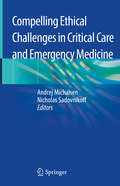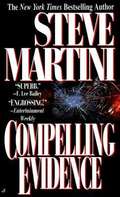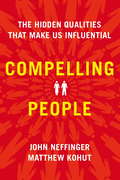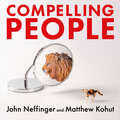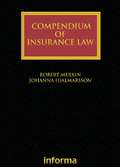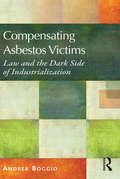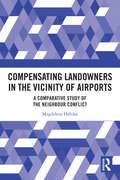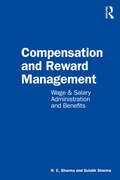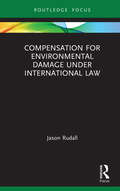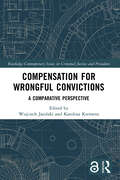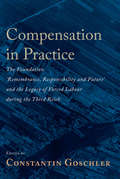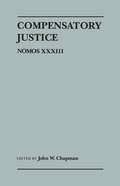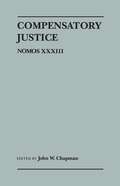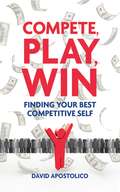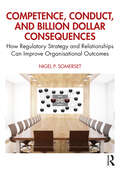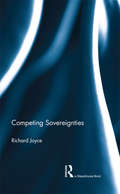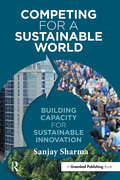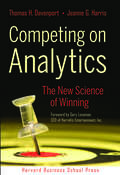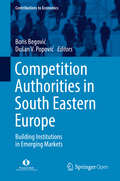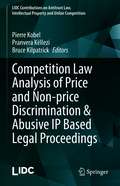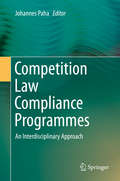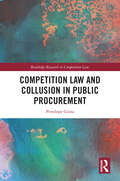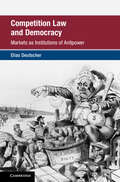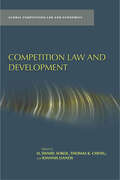- Table View
- List View
Compelling Ethical Challenges in Critical Care and Emergency Medicine
by Andrej Michalsen Nicholas SadovnikoffThis book addresses the ethical problems that physicians have to face every day while caring for critically ill patients. Advances in medical technology, ageing societies worldwide, and their increased demands on health care systems have, on the one hand, led to better care and remarkable longevity in many parts of the world. On the other hand, however, improved treatments in many medical fields, amongst others in emergency and critical care, have resulted in more patients surviving with reduced quality of life. This entails tradeoffs for many patients, their families, and the teams caring for them. At the same time, health care expenditures have risen dramatically and have to be balanced against costs for other public goods. Finally, the humane aspects of care have often failed to keep pace with the remarkable technological strides made in recent years.In this book, experts in their respective fields describe compelling ethical challenges resulting from these discrepancies and discuss potential solutions. The book is primarily intended for clinicians who care for two of the most vulnerable patient subpopulations – those being treated in ambulances or emergency rooms, and those being treated at intensive care units – due in part to the fact that they may be temporarily or permanently incapacitated. Core medical skills, such as diagnosis and predicting outcomes, as well as implementing treatment, remain challenging. However, without adequate communication and collaboration both within the inter-professional treatment teams and between the teams and the patients/their families, delivering excellent care is difficult at best. Therefore, the so-called “soft skills” are given the attention they deserve in order to overcome the gap between technological progress and interpersonal standstill.
Compelling Evidence
by Steve MartiniThe defense lawyer is Paul Madriani. The accused is his ex-lover, Talia Potter. The victim died of a gunshot wound to the head. He was Paul Madriani's boss, his mentor, his friend. And he was Talia Potter's husband...
Compelling People: The Hidden Qualities That Make Us Influential
by John Neffinger Matthew Kohut'This is not just another pop-psych book: it's the first book to capture and share the insights from all the recent groundbreaking research on how we judge and persuade each other. And it translates that into simple, practical terms anyone can use to build more effective relationships at the office or home' Amy CuddyHOW PEOPLE JUDGE YOU - AND HOW TO COME OUT LOOKING GOOD Everyone wants to know how to be more influential. But most of us don't really think we can have the kind of magnetism or charisma that we associate with someone like Bill Clinton or Oprah Winfrey unless it comes naturally. In Compelling People - now required reading and Harvard Business School - John Neffinger and Matthew Kohut show that this isn't something we have to be born with, it's something we can learn. They trace the path to influence through a balance of strength and warmth. Each seems simple, but only a few of us figure out the tricky task of projecting both at once. Drawing on cutting-edge social science research as well as their own work with Fortune 500 executives, members of Congress, TED speakers and Nobel Prize winners, Compelling People explains how we size each other up - and how we can learn to win the admiration, respect, and affection we desire.
Compelling People: The Hidden Qualities That Make Us Influential
by John Neffinger Matthew Kohut'This is not just another pop-psych book: it's the first book to capture and share the insights from all the recent groundbreaking research on how we judge and persuade each other. And it translates that into simple, practical terms anyone can use to build more effective relationships at the office or home' Amy CuddyHOW PEOPLE JUDGE YOU - AND HOW TO COME OUT LOOKING GOOD Everyone wants to know how to be more influential. But most of us don't really think we can have the kind of magnetism or charisma that we associate with someone like Bill Clinton or Oprah Winfrey unless it comes naturally. In Compelling People - now required reading at Harvard Business School - John Neffinger and Matthew Kohut show that this isn't something we have to be born with, it's something we can learn. They trace the path to influence through a balance of strength and warmth. Each seems simple, but only a few of us figure out the tricky task of projecting both at once. Drawing on cutting-edge social science research as well as their own work with Fortune 500 executives, members of Congress, TED speakers and Nobel Prize winners, Compelling People explains how we size each other up - and how we can learn to win the admiration, respect, and affection we desire.
Compendium of Insurance Law (Lloyd's Insurance Law Library)
by Robert Merkin Johanna HjalmarssonThe Compendium of Insurance Law consolidates diverse insurance law sources, statutes and codes of practice in one comprehensive volume. Each piece of legislation is supplemented by detailed annotations, which explain the operation and relationship of the legislation with other sources of insurance law. The book is filled with comprehensive coverage of legislation relating to the following areas: regulation, reinsurance, life assurance, property insurance, marine insurance, liability insurance, motor insurance, insurance intermediaries, insurance contracts and competition.
Compensating Asbestos Victims: Law and the Dark Side of Industrialization
by Andrea BoggioThis book traces the emergence and transformations of asbestos compensation to explore the wider issue of to what extent legal systems have converged in the era of globalization. Examining the mechanism by which asbestos compensation is delivered in Belgium, England, Italy and the United States, as well as the cultural forces and actors which contribute to its emergence and transformations, the book advances our understanding of how law operates within cultural norms, routines, and institutional relations of capitalist societies. With material gathered from 50 interviews and from primary and secondary sources, the author considers law as a cultural phenomenon, national styles of legal culture and the convergence and divergence of legal cultures, and law as a form of institutionalized power.
Compensating Landowners in the Vicinity of Airports: A Comparative Study of the Neighbour Conflict
by Magdalena HabdasThe purpose of this book is to consider the neighbour conflict arising between airports and neighbouring owners of land, particularly with residential uses, as well as to assess the existing solutions applied to manage or resolve that conflict. The book explains why the neighbour conflict between the airport and landowners is of a particular kind and what legal instruments are applied to resolve it in an attempt to balance the interests of opposing parties. Readers will develop an understanding of how the law operates when damage is caused by a legal act of the government and what the limits of compensable loss are. In addition, the reader will discover the economic foundations of possible solutions and why not all market losses are legally compensable. Key features of this book include: • a consideration of key legal concepts such as neighbour law, nuisance, protection of property, land use restrictions, liability, and compensation to inform a unique analysis of neighbour law in the context of conflict between airports and neighbouring landowners • practical guidance on an airport’s legal liability towards neighbouring landowners • a comparative analysis of airport’s liability, compensation claims, their scope and economic effects • a comparative overview of planning and environmental solutions applied in a variety of jurisdictions • discussion of valuation methods and challenges when loss of property value is the measure of compensation The author’s intention is to promote conscious and civil relations among market participants, as opposed to opportunistic and speculative behaviour. This book is important reading for lawyers, academics, PhD students, and postgraduate students dealing with land use regulations, environmental law, compulsory purchase, eminent domain and expropriation issues and compensation for property restrictions, as well as with aviation law and legal aspects of airport operations.
Compensation Schemes for Damages Caused by Healthcare and Alternatives to Court Proceedings: Comparative Law Perspectives (Ius Comparatum - Global Studies in Comparative Law #53)
by Dobrochna Bach-GoleckaThe book discusses compensation mechanisms and other non-judicial means that offer alternatives to court proceedings, designed and provided for within national legal regimes. Such schemes are primarily of a civil or administrative character and are mainly intended to supplement criminal liability for medical negligence. As such, the book focuses on medical malpractice and prospective medical harm from a civil law perspective. It examines the contemporary perspective of a patient-physician relationship, which has evolved from a relation of a quasi-patrimonial character into a partnership of quasi-equal parties, dealing with a medical treatment procedure as a scientific endeavor. It also reviews the extra-legal conditions that are taken into account in compensation arrangements, particularly the need to satisfy a psychological urge for conciliation and empathy on the part of medical personnel. Lastly, the book explores the responsibility of public authorities and healthcare providers to guarantee access to healthcare that is of a sufficient quality, based upon standards provided for in international (and European) law.
Compensation and Reward Management: Wage and Salary Administration and Benefits
by Sulabh Sharma R. C. SharmaThis book presents a comprehensive account of the intricacies related to compensation and reward management in Indian organizations—a vital strategic feature of HR management. It presents a blend of theoretical concepts, definitions, approaches, methods and techniques related to compensation practices being followed/likely to be followed in organizations. Starting with a conceptual framework, it discusses wage determination and wage fixation practices in India, salary reviews and reward management policies, and processes and procedures, in addition to international remuneration with special reference to expatriates and the remuneration of third country nationals. In addition to examining the designing and monitoring of salary grade structures including salary progression curves, it spells out divergent systems and institutions for wage determination/wage fixation practices in Indian organizations.Rich in pedagogical features, including learning objectives, discussion questions, individual and group activities, the volume also has numerous case studies. This book will be useful to students of human resource management, business economics, corporate finance, corporate governance, organizational studies, strategic management, finance, business and industry, public administration, social work and other allied fields.
Compensation for Environmental Damage Under International Law (Routledge Research in International Environmental Law)
by Jason RudallInspired by recent litigation, this book identifies and critically appraises the manifold and varied approaches to calculating compensation for damage caused to the environment. It examines a wide range of practice on compensation – in general and specifically for environmental damage – from that of international courts and tribunals, as well as international commissions and regimes, to municipal approaches and other disciplines such as economics and philosophy. Compensation for Environmental Damage Under International Law synthesises these approaches with a view to identifying their blind spots, bringing clarity to an area where there exists broad discrepancy, and charting best practices that appropriately balance the manifold interests at stake. In particular, it is argued that best practice methodologies should ensure compensation serves to fully repair the environment, reflect the emerging ecosystems approach and any implications environmental damage may have for climate change, as well as take into account relevant equitable considerations. This book is essential reading for academics, practitioners and students working in the field of environmental law.
Compensation for Wrongful Convictions: A Comparative Perspective (Routledge Contemporary Issues in Criminal Justice and Procedure)
by Karolina Kremens Wojciech JasińskiThis book presents a comprehensive comparative analysis of the substantive and procedural aspects of compensation for wrongful convictions in European countries and the USA, as well as the standard derived from the case law of the European Court of Human Rights. The collection draws comparative conclusions as to the similarities and differences between selected jurisdictions and assesses the effectiveness of the national compensation schemes. This enables the designing of an optimum model of compensation, offering accessibility and effectiveness to the victims of miscarriages of justice and being acceptable to jurisdictions based on common law, and civil law traditions, as well as inquisitorial and adversarial types of criminal process. Moreover, the discussion of the minimum European standard as established in the case law of the European Court of Human Rights enables readers to identify how the Strasbourg Court can contribute to strengthening the compensation scheme. The book will be essential reading for students, academics and policymakers working in the areas of criminal law and procedure.
Compensation in Practice: The Foundation 'Remembrance, Responsibility and Future' and the Legacy of Forced Labour during the Third Reich
by Constantin GoschlerFounded in 2000, the German Foundation "Remembrance, Responsibility and Future" is one of the largest transitional justice initiatives in history: in cooperation with its international partner organizations, it has to date paid over 4 billion euros to nearly 1.7 million survivors of forced labour during the Nazi Era. This volume provides an unparalleled look at the Foundation's creation, operations, and prospects after nearly two decades of existence, with valuable insights not just for historians but for a range of scholars, professionals, and others involved in human rights and reconciliation efforts.
Compensatory Justice: Nomos XXXIII (NOMOS - American Society for Political and Legal Philosophy #27)
by John W. ChapmanThis Major Reference series brings together a wide range of key international articles in law and legal theory. Many of these essays are not readily accessible, and their presentation in these volumes will provide a vital new resource for both research and teaching. Each volume is edited by leading international authorities who explain the significance and context of articles in an informative and complete introduction.
Compensatory Justice: Nomos XXXIII (NOMOS - American Society for Political and Legal Philosophy #27)
by John W. ChapmanThis Major Reference series brings together a wide range of key international articles in law and legal theory. Many of these essays are not readily accessible, and their presentation in these volumes will provide a vital new resource for both research and teaching. Each volume is edited by leading international authorities who explain the significance and context of articles in an informative and complete introduction.
Compete, Play, Win: Finding Your Best Competitive Self
by David ApostolicoThis book is a sociological examination of competition and the competitive drive, told from the viewpoint of a competition freak. The author explores the energy and force behind the need to compete, and what the consequence of that need is. In the chapter "Sperm Wars," Apostolico discusses conception as the beginning of the competitive nature of humans, while also discussing the competition for a mate that precedes it. Through this, he sets up the idea of a biological necessity for competition and how evolution has modified and enhanced that drive. In a later chapter called "Competitive Nature," Apostolico participates in as many competitive endeavors as possible (eating contests, drag races, dog shows, etc.) and answers a set of 10 questions about each, concluding with, "Can a competitive junkie ever truly feel satisfied?"
Competence, Conduct, and Billion Dollar Consequences: How Regulatory Strategy and Relationships Can Improve Organisational Outcomes
by Nigel P. SomersetThis practical guide to understanding how regulators build insight and form judgements will help organisations to develop their strategy and approach to engagement and to improve their regulatory outcomes. From robot-assisted surgery and advances in stem cell technology, the explosion in use of social media and advances in computing power to the development of autonomous vehicles and digital environments such as the metaverse, these exciting developments present questions, invite debate and have implications. These rapid new developments also join a world described as being increasingly VUCA (volatile, uncertain, complex, and ambiguous), making industry-regulator relationships more important than ever to prevent consumer harm and to configure business success. This book is written for those who wish to build positive and progressive relationships with their regulators in these exciting times of rapid advancement. From developing their strategy, through to the practicalities of how to prepare and engage with regulators, readers are navigated through an ecosystem of insight to help build an understanding of what informs their regulator’s opinion and judgements. Underpinned with real-world experiences and examples, this book shows that, through clearer strategic focus and more effective relationships, organisations can refine their approach and build their relationships to drive mutually beneficial regulatory relationships that avoid negative consequences and unnecessary costs. Board members, executives, senior leaders, risk, compliance, legal professionals, regulators, and students of business, finance, and law will refer to this book again and again to guide holistic thinking about regulatory relationships and use the insights these can provide to help them calibrate their actions, activities, and progress.
Competing Sovereignties
by Richard JoyceCompeting Sovereignties provides a critique of the concept of sovereignty in modernity in light of claims to determine the content of law at the international, national and local levels. In an argument that is illustrated through an analysis of debates over the control of intellectual property law in India, Richard Joyce considers how economic globalization and the claims of indigenous communities do not just challenge national sovereignty - as if national sovereignty is the only kind of sovereignty - but in fact invite us to challenge our conception of what sovereignty ‘is’. Combining theoretical research and reflection with an analysis of the legal, institutional and political context in which sovereignties 'compete', the book offers a reconception of modern sovereignty - and, with it, a new appreciation of the complex issues surrounding the relationship between international organisations, nation states and local and indigenous communities.
Competing for a Sustainable World: Building Capacity for Sustainable Innovation
by Sanjay SharmaSustainable innovation requires more than a clear vision and commitment. It requires effective execution and implementation based on an ongoing systematic process of engaging stakeholders to generate the evolving information critical for guiding decision-making, developing and implementing business logic for sustainable innovation, overcoming decision-making biases by managers, creating an opportunity framework to spark creativity, and developing effective organizational capabilities to build a sustainable innovation DNA within the organization. Such a capacity provides an organization with the ability to anticipate and overcome internal and external barriers and achieve competitive advantage through sustainable innovation of products, services, and business models. Based on original research, current state-of-the-knowledge, and relevant examples, this book comprehensively outlines and describes the process that managers can undertake to effectively and successfully implement a sustainability strategy that will help them attract and retain managerial talent; increase operating legitimacy and reduce compliance costs; boost stakeholder support; reduce costs through increased efficiency, quality, reliability, safety, and responsiveness of existing operations; foster radical innovations in processes, products, services, and new markets; and promote competitive imagination of future products, services, and business models.
Competition Authorities in South Eastern Europe: Building Institutions in Emerging Markets (Contributions to Economics)
by Boris Begović Dušan V. PopovićThis open access book provides answers to key open questions concerning competition policy in emerging economies, with a focus on South Eastern Europe. The contributions address two major issues. One is the design of competition policy and the national competition authorities that enforce it, including the topics of competition advocacy and state aid control; the other is the use of economic methods in competition law enforcement, especially in the cases of relevant market definition and merger control. Many lessons learned in the countries of South Eastern Europe can be applied to the emerging markets of other regions. As such, the findings presented here will be highly relevant for officials and staff at national competition authorities, advisers to legislators shaping national competition policy, competition law professionals, and university students alike.
Competition Law Analysis of Price and Non-price Discrimination & Abusive IP Based Legal Proceedings (LIDC Contributions on Antitrust Law, Intellectual Property and Unfair Competition)
by Bruce Kilpatrick Pierre Kobel Pranvera KëlleziThis book gathers national and international reports from around the globe on key issues in the field of antitrust and intellectual property. Its first part discusses to what extent competition law should be concerned with differences in prices, terms and conditions, or quality that suppliers offer different purchasers. A detailed international report explores the major trends and challenges in this field and provides an excellent comparative study on this complex and challenging subject.In turn, the second part examines whether there should be legal restrictions on the ability of persons who claim, without sufficient justification, to hold IP rights that have been infringed on, to bring, or to threaten to bring, legal proceedings based on such claims against their competitors or others. In this regard, the book brings together the current legal responses across a number of European countries and elsewhere in the world, all summarised and elaborated on in an international report.The book also includes the resolutions passed by the General Assembly of the International League of Competition Law (LIDC) following debates on each of these topics, which include proposed solutions and recommendations. The LIDC is a long-standing international association that focuses on the interface between competition law and intellectual property law, including unfair competition issues.
Competition Law Compliance Programmes: An Interdisciplinary Approach
by Johannes PahaThis book reviews and presents antitrust law compliance programmes from different angles. These programmes have been increasingly implemented and refined by firms over recent years, and various aspects of this topic have been researched. The contributions in this book extend beyond the treatment of legal issues and show how lawyers, economists, psychologists, and business scholars can help design antitrust law compliance programmes more effectively and run them more efficiently.
Competition Law and Collusion in Public Procurement (Routledge Research in Competition Law)
by Penelope GiosaThis book examines infringements of competition law in public procurement settings, evaluating the latest European Procurement Directive 2014/24/EU to examine to what extent its provisions facilitate or deter collusion during specific award procedures.Public contracts account for a significant proportion of EU expenditure. In sectors such as energy, transport, social protection and the provision of health or education services, public authorities are the main purchasers. It is important to ensure that public contracts are awarded in an open, fair and transparent manner that enables domestic and non-domestic firms to compete on an equal basis, with the aim of improving the quality and lowering the price of purchases made by public authorities. This book assesses the competition law enforcement mechanisms that competition regulators bring to the area of public procurement in the attempt to deter bid rigging. It analyzes key tools for the public and private enforcement of competition law in the domain of public contracts, such as the leniency programme, damages claims for bid rigging and the whistle blower programme. The book uses auction theory as benchmark to assess the risk of collusion in the context of procurement procedures and techniques. Offering a holistic analysis informed by research, it makes recommendations for better design, set up and management of public tenders without distorting competition. Highlighting the need to make use of competition law enforcement mechanisms in the battle against collusion in public procurement, it identifies ways in which the procurement process can be improved, to reduce and prevent bid rigging.The book will be of interest to researchers in the field of competition law, public procurement and EU law.
Competition Law and Democracy: Markets as Institutions of Antipower (Global Competition Law and Economics Policy)
by Elias DeutscherExamining the normative foundations of US antitrust and EU competition law, Elias Deutscher argues that the idea of a competition-democracy nexus rests on a commitment to a republican understanding of economic liberty. The book uses this republican concept of economic liberty to analyse how US antitrust and EU competition law embodied a competition-democracy nexus and explains how the turn of competition law toward a more economic approach has led to its decline. The book offers proposals for how the nexus can be revived to allow competition law to address contemporary concerns about the concentration of corporate power.
Competition Law and Development
by Ioannis Lianos D. Daniel Sokol Thomas K. ChengThe vast majority of the countries in the world are developing countries—there are only thirty-four OECD (Organisation for Economic Co-operation and Development) countries—and yet there is a serious dearth of attention to developing countries in the international and comparative law scholarship, which has been preoccupied with the United States and the European Union. Competition Law and Development investigates whether or not the competition law and policy transplanted from Europe and the United States can be successfully implemented in the developing world or whether the developing-world experience suggests a need for a different analytical framework. The political and economic environment of developing countries often differs significantly from that of developed countries in ways that may have serious implications for competition law enforcement. The need to devote greater attention to developing countries is also justified by the changing global economic reality in which developing countries—especially China, India, and Brazil—have emerged as economic powerhouses. Together with Russia, the so-called BRIC countries have accounted for thirty percent of global economic growth since the term was coined in 2001. In this sense, developing countries deserve more attention not because of any justifiable differences from developed countries in competition law enforcement, either in theoretical or practical terms, but because of their sheer economic heft. This book, the second in the Global Competition Law and Economics series, provides a number of viewpoints of what competition law and policy mean both in theory and practice in a development context.
